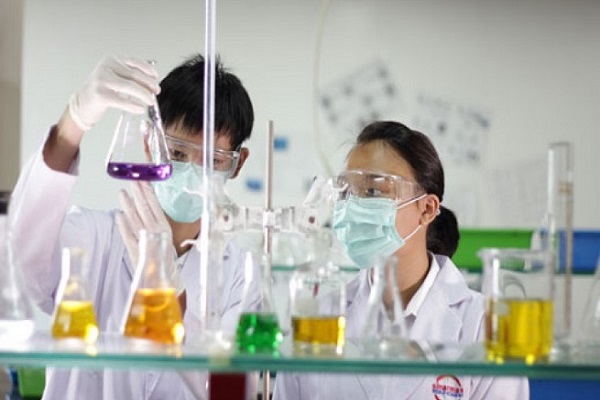M.Sc.in Pharmaceutical Chemistry Course: Details, Eligibility, Fees, Syllabus, Placements
The Master of Pharmaceutical Chemistry (M.Pharm in Pharmaceutical Chemistry) is a specialized postgraduate degree program aimed at providing advanced education and training in the principles and applications of pharmaceutical chemistry. This program delves deeply into the molecular aspects of drug design, synthesis, analysis, and characterization, equipping students with the knowledge and skills necessary for careers in pharmaceutical research, development, and manufacturing. Here's an overview of M.Pharm in Pharmaceutical Chemistry:

- M.Pharm in Pharmaceutical Chemistry provides a rigorous and specialized education in the molecular aspects of drug development.
- Preparing graduates for rewarding careers in pharmaceutical research, industry, academia, and regulatory affairs.
- It empowers students to make significant contributions to the field of pharmaceutical chemistry and the broader healthcare sector through innovation, discovery, and scientific advancement.
- Curriculum encompasses advanced coursework in medicinal chemistry, organic chemistry, analytical chemistry, spectroscopy, and computational chemistry.
- Emphasis on understanding the structure-activity relationships (SAR) of drugs, drug metabolism, pharmacokinetics, and drug-receptor interactions.
- Practical training includes laboratory work, synthesis of pharmaceutical compounds, chromatographic techniques, spectroscopic analysis, and computer-aided drug design (CADD).
Why Choose Master of Pharmaceutical Chemistry (M.Pharm in Pharmaceutical Chemistry)?
Choosing to pursue a Master of Science (M.Sc) in Microbiology provides numerous convincing reasons for people who are fascinated by the microbial world and its applications. This specialised programme offers a unique opportunity to delve extensively into the fascinating world of microorganisms, which include bacteria, viruses, fungus, protozoa, and algae. Students learn advanced knowledge and abilities in microbiology, such as microbial variety, ecology, genetics, and physiology, through a demanding academic curriculum and hands-on laboratory practice. Furthermore, the programme includes specialised tracks such as medical microbiology, industrial microbiology, and environmental microbiology, allowing students to tailor their studies to their specific interests and professional goals. The M.Sc in Microbiology also emphasises research, giving students the ability to perform original studies and contribute to scientific discovery. This research-focused approach cultivates critical thinking, problem-solving abilities, and a thorough comprehension of scientific technique. The program's graduates emerge as highly competent professionals, ready to pursue a variety of careers in academia, healthcare, biotechnology, environmental science, and other fields. M.Sc Microbiology graduates, whether they work in research, industry, or public health, play critical roles in solving global concerns such as infectious illnesses, antibiotic resistance, bioremediation, and food safety. Finally, pursuing an M.Sc in Microbiology not only offers doors to intriguing careers.
- Skills and Competencies:
- Advanced knowledge in organic and medicinal chemistry, including principles of drug design and synthesis.
- Proficiency in analytical techniques such as chromatography, spectroscopy, and mass spectrometry for drug characterization.
- Experience with computational chemistry tools and software for molecular modeling and virtual screening.
- Critical thinking, problem-solving, and research skills necessary for drug discovery and development.
- Effective communication skills for presenting research findings and collaborating with multidisciplinary teams.
- Contribution to the Field:
- Advances the understanding of drug structure-function relationships and mechanisms of action.
- Contributes to the development of new pharmaceutical compounds with improved efficacy, safety, and pharmacokinetic properties.
- Plays a crucial role in addressing unmet medical needs and improving healthcare outcomes through innovative drug discovery and design.
- Research and Thesis:
- Central component of the program is a research project or thesis, allowing students to conduct original research under the supervision of faculty members.
- Research topics may include drug discovery, synthesis of novel pharmaceutical compounds, development of drug delivery systems, or investigation of drug metabolism pathways.
- Provides opportunities for students to apply theoretical knowledge and research skills to address real-world challenges in pharmaceutical chemistry.
- Career Opportunities:
- Pharmaceutical Industry: Roles in drug discovery and development, medicinal chemistry, process chemistry, and quality control.
- Pharmaceutical Industry: Roles in drug discovery and development, medicinal chemistry, process chemistry, and quality control.
- Regulatory Agencies: Careers in regulatory affairs, ensuring compliance with safety and quality standards for pharmaceutical products.
- Academia: Teaching and research positions in colleges, universities, and research institutes, contributing to the advancement of pharmaceutical sciences.
USP's
- Experienced faculty members to enrich comprehensive knowledge.
- Value added courses
- L & T Powered Programmes.
- Guaranteed Campus Internship and Placement Drive.
- Nasscom foundation industry oriented courses
- IBM, TCS advanced technologies program
Fee Structure
| Year | Fee |
|---|---|
| First Year | ₹ 77,000 |
| Second Year | ₹ 60,000 |
Admission Criteria
Bachelor in Pharmacy or equivalent degree with at least 60% marks from recognized university or institution
















